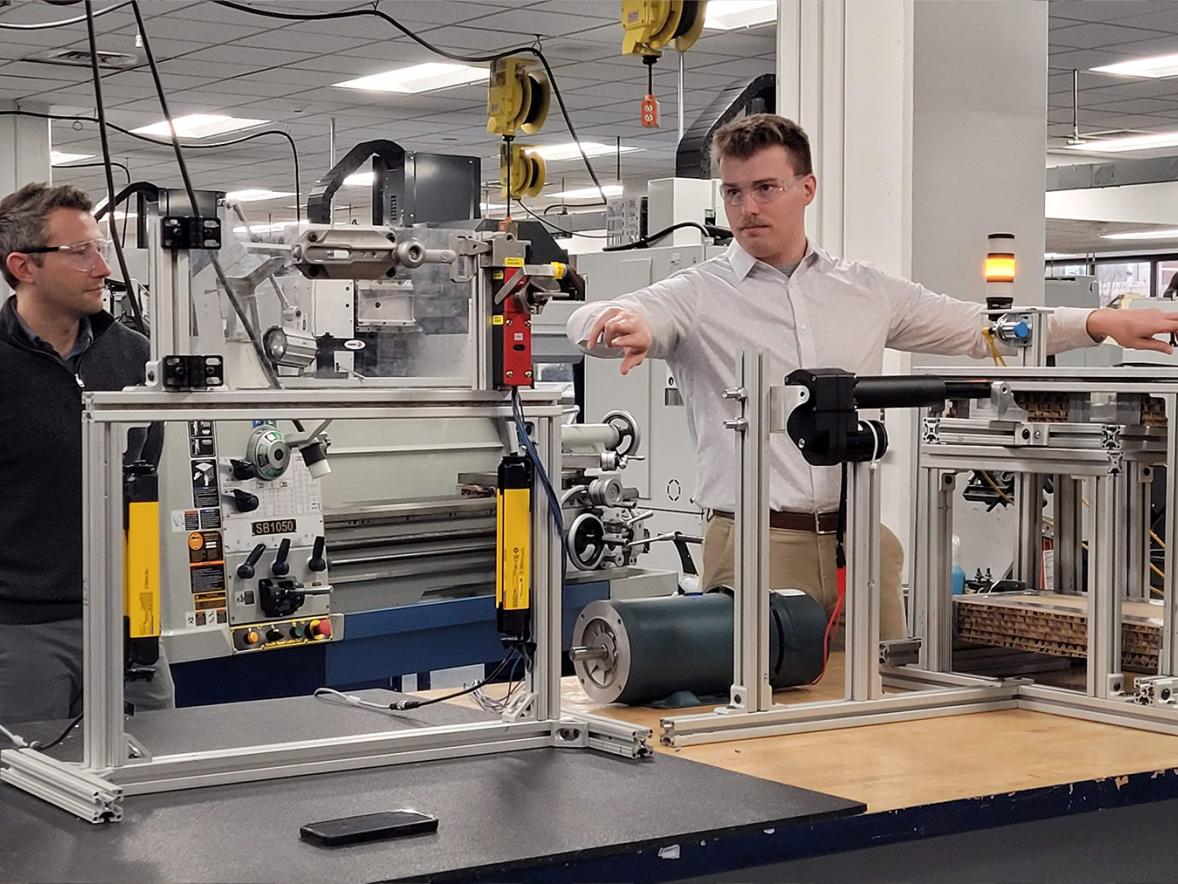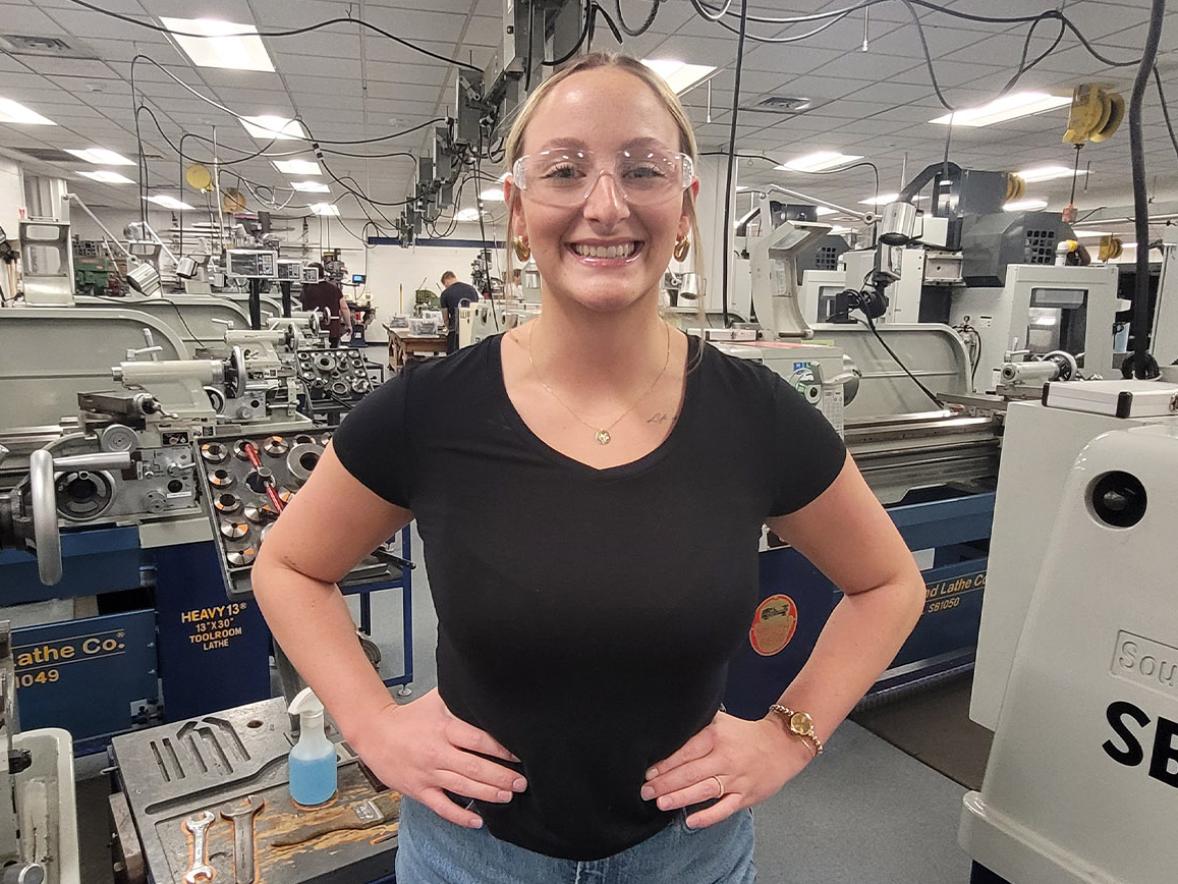Transform Ideas Into Reality
UW-Stout's ABET-accredited Bachelor of Science (B.S.) in Mechanical Engineering (ME) degree prepares you to design and manufacture nearly everything—from micro-scale objects to medical devices and airplanes. Mechanical engineers explore the latest technology, design innovative machines, and collaborate with other professionals in teams to transform ideas into tangible products.
100% of Graduates Are Employed or Continuing Education Within 6 Months
UW-Stout's Mechanical Engineering program offers one of the most highly-sought engineering degrees in the region. As Wisconsin’s Polytechnic University, UW-Stout continues to fill the demand for highly trained and experienced engineers.
Career-Defining Curriculum
Explore the multifaceted world of Mechanical Engineering at UW-Stout, where logic and creativity intersect. Our curriculum covers the full spectrum of the engineering design process, integrating key subjects such as mechanics, kinematics, thermal and fluid sciences, materials science, structural analysis, and electronics. This comprehensive approach equips you with a deep understanding and hands-on skills, readying you for the dynamic challenges in mechanical engineering.
Double Major in Mechanical Engineering & Physics
Use the Request Information form to receive a program summary and learn more about the Bachelor of Science degree in Mechanical Engineering.
Request Information

UW-Stout's B.S. Mechanical Engineering program is accredited by the Engineering Accreditation Commission of ABET, under the commission’s General Criteria and Program Criteria for Mechanical and Similarly Named Engineering Programs.
Earn Credit for Prior Learning
Some required credits for this program can be earned through academic testing, portfolio submission, or a demonstration of competency. Learn more by reviewing the program-specific details on our Credit for Prior Learning page.
"The professors were extremely knowledgeable and helpful. We learned the critical-thinking skills to overcome any challenges we face in our careers, and the hands-on labs prepared us to deal with real problems. I apply those skills in industry."
~Jamison Noye ('18)
Senior Process Development Engineer
Abbott
Industry-Experienced Faculty Instruction
Forget TA-taught classes and 200-person lectures. At UW-Stout, building close relationships with our industry-experienced and academically accomplished engineering faculty will play a key role in your polytechnic education and your career. Learn more about your future instructors!
Do More in Our Industry-Standard Labs
We offer a dynamic and practical polytechnic hands-on learning environment with state-of-the-art labs and facilities. You'll work closely with faculty in preparation for your required co-op or internship with an approved employer. After graduation, you'll be ready for advanced degree work that many UW-Stout engineering graduates have pursued.
Professional Internships in Mechanical Engineering
Take your education into industry and earn while you learn through UW-Stout’s award-winning Cooperative Education & Internship Program (CEIP) and other placements. Our professional paid and unpaid credit-earning experiences connect you with leaders in your field, including Fortune 500 employers and regional corporations, to ensure you’re set up for success long before you graduate. More than a third of Stout students accept positions after graduation with their internship employer.
Recent Internship Employers
- Aerojet Rocketdyne
- Andersen Corporation
- Bobcat Company
- Boston Scientific
- General Motors
- Hewlett Packard Enterprise
- Jennie-O Turkey Store
- nVent
Select Internship Position Titles
- Advanced Operations Intern
- Development Engineer Intern
- Mechanical Engineering Intern
- Process Engineering Intern
- Product & Materials Intern
- Production Management Intern
- Project Management Intern
- Quality Intern
Industry-Sponsored Engineering Projects & Capstones
Unlike traditional engineering programs, UW-Stout’s B.S. Mechanical Engineering takes you beyond theory long before you graduate with professional projects that put you in contact with top employers. While other students are still reading about your field, you’ll be designing and testing real R&D solutions on behalf of industry partners, many of which hire our graduates.
Industry Partners
- 3M
- Advanced Molding Technologies
- Andersen Corporation
- Ashley Furniture Industries
- Cirrus Aircraft
- Fastenal
- GaeStar Corporation
- Graco
- Greenheck Group
- Mantle, Inc.
- Merrick Production Systems
- nVent
- OEM Fabricators
- Viracon
$70K Average Starting Salary of UW-Stout Mechanical Engineering Graduates
Graduate Ready to Solve Tomorrow’s Engineering Challenges
Each year, Stout mechanical engineering graduates are among the most sought-after hires to enter the workforce, routinely beating out applicants from bigger schools for coveted positions with major employers. Why? Everything you learn at Stout enhances the skills you'll use on day one of your career. Where others list their education, you’ll be able to identify your experience.
Recent Employers
- 3M
- Andersen Corporation
- Ashley Furniture Industries
- Barry-Wehmiller Companies
- Boston Scientific
- Cirrus Aircraft
- Collins Aerospace
- General Motors
- Greenheck Group
- Harley-Davidson Motor Company
- Hormel Foods Corporation
- John Deere
- Milwaukee Tool
- Phillips-Medisize Corporation
- Trane Technologies
- Westinghouse Electric Company
Discover More Degrees in Engineering
Students enrolled in the B.S. Mechanical Engineering program will be charged a special program fee in differential tuition once the student has earned at least 30 credits and has enrolled in ENGR-292.
As a student in the Mechanical Engineering program, you must have an aptitude for science and mathematics. We encourage you to take as many upper-level math and science courses in high school as possible, including mathematics through algebra and trigonometry, plus physics and chemistry. Early development of computer skills is also very helpful.
Starting Out
Industry's mechanical engineering problems are not only technical in nature. They're also social and economic. As a mechanical engineer, you must, therefore, have a broad education. The first two years of your program will include English composition, communication, and other general education offerings, as well as mathematics, physics and engineering fundamentals.
As You Progress
Science and mathematics classes form the foundation for engineering science courses, and their application to analysis, synthesis and creative design. As you work through the program, the courses will emphasize fundamental tools for creating solutions to problems found in industry, including thermal & fluid sciences, structural mechanics & machine design, and controls & instrumentation. You'll receive extensive laboratory experience in those and related areas, getting hands-on learning opportunities with engines, wind tunnels, simulation software, and heating/cooling/air conditioning systems.
Program Educational Objectives
The mission of the Bachelor of Science in Mechanical Engineering program at the University of Wisconsin–Stout is to produce graduates who:
- Embrace their role as representatives of their profession and as leaders of the projects, people, and ideas that solve technical problems in a(n) ethical, economic, social, and environmental context.
- Demonstrate self-reliance, accountability, autonomy, confidence, respectfulness, and a professional sense of direction while promoting engagement and collaboration within a team.
- Clearly and concisely communicate ideas to technically, socially, and globally diverse audiences to build consensus and drive results.
- Comfortably confront ambiguous and complex problems to create innovative solutions by leveraging standard and domain-specific skills, sharing their expertise, effectively generating ideas, and acquiring new knowledge.
Student Learning Outcomes
The mechanical engineering program at UW-Stout will prepare graduates for successful careers in mechanical engineering related professions and other career paths. The program will prepare students to sit for the Fundamentals of Engineering (FE) exam, administrated by the National Council of Examiners for Engineering and Surveying (NCEES). Upon completing the degree program at UW-Stout, students will have attained the following outcomes as defined by the ABET-EAC accreditation requirements:
- An ability to identify, formulate, and solve complex engineering problems by applying principles of engineering, science, and mathematics.
- An ability to apply engineering design to produce solutions that meet specified needs with consideration of public health, safety, and welfare, as well as global, cultural, social, environmental, and economic factors.
- An ability to communicate effectively with a range of audiences.
- An ability to recognize ethical and professional responsibilities in engineering situations and make informed judgments, which must consider the impact of engineering solutions in global, economic, environmental, and societal contexts.
- An ability to function effectively on a team whose members together provide leadership, create a collaborative and inclusive environment, establish goals, plan tasks, and meet objectives.
- An ability to develop and conduct appropriate experimentation, analyze and interpret data, and use engineering judgment to draw conclusions.
- An ability to acquire and apply new knowledge as needed, using appropriate learning strategies
Advisory Committee Members
| First Name | Last Name | Title | Organization |
|---|---|---|---|
| Anwr | Al-Baghdadi | Lecturer | UW-Stout |
| Deslyn | Baynton | Mechanical Engineer, Operations Leadership | Andersen Corporation |
| Chris | Bendel | Associate Dean | UW-Stout |
| Devin | Berg | Associate Professor | UW-Stout |
| Glenn | Bushendorf | Senior Lecturer | UW-Stout |
| Paul | Craig | Instrumentation Innovator; Program Director, B.S. Manufacturing Engineering | UW-Stout |
| David | Ding | Associate Dean; Director, Robert F. Cervenka School of Engineering | UW-Stout |
| Jason | Eccles | Operations Manager | Bending Branches LLC |
| Jeff | Esselman | Director, Quality Assurance | Innovia Medical |
| Logan | Fogeltanz | Advanced Manufacturing Engineer | Accessories Value Engineering |
| Daniel | Freedman | Dean, CSTEMM | UW-Stout |
| Christian | Gausman | Director, Engineering | OEM Fabricators, Inc. |
| Abhimanyu | Ghosh | Assistant Professor | UW-Stout |
| Oai | Ha | Assistant Professor | UW-Stout |
| Rick | Kirscher | Vice President, Engineering | CPC |
| Kevin | Larson | Manufacturing Engineer | DCA Manufacturing |
| Dave | Leisses | General Manager | JF Ahern |
| Marty | Mathews | Vice President, Technology | AirPro Fan & Blower Company |
| Daniel | Mendonza | Project Engineer | Advanced Molding Technologies |
| Steven | Pax | Engineering Manager | SCT Manufacturing |
| Anthony | Plechacek | Mechanical Engineering Student | UW-Stout |
| Laura | Reimer | Value Analysis Productivity Engineer | Trane Technologies |
| Jeff | Richmond | Assistant General Plant Manager | Midwest Manufacturing |
| Peter | Rogers | Xcel Energy | |
| Anne | Schmitz | Associate Professor; Chair, Engineering & Technology Department | UW-Stout |
| George | Singh | Development Engineer | Trane Technologies |
| Vivek | Singhal | Assistant Professor | UW-Stout |
| Taylor | Smith | Product Development Engineer | Greenheck Fan Corporation |
| Nathan | Spike | Assistant Professor; Program Director | UW-Stout |
| Ron | Thomas | Senior Management Engineer | Stout Technology Transfer Institute |
| Todd | Treichel | Program Manager and Business Development | Sierra Space |
| Abhishek | Verma | Associate Professor | UW-Stout |
| Vincent | Wheeler | Associate Professor | UW-Stout |







